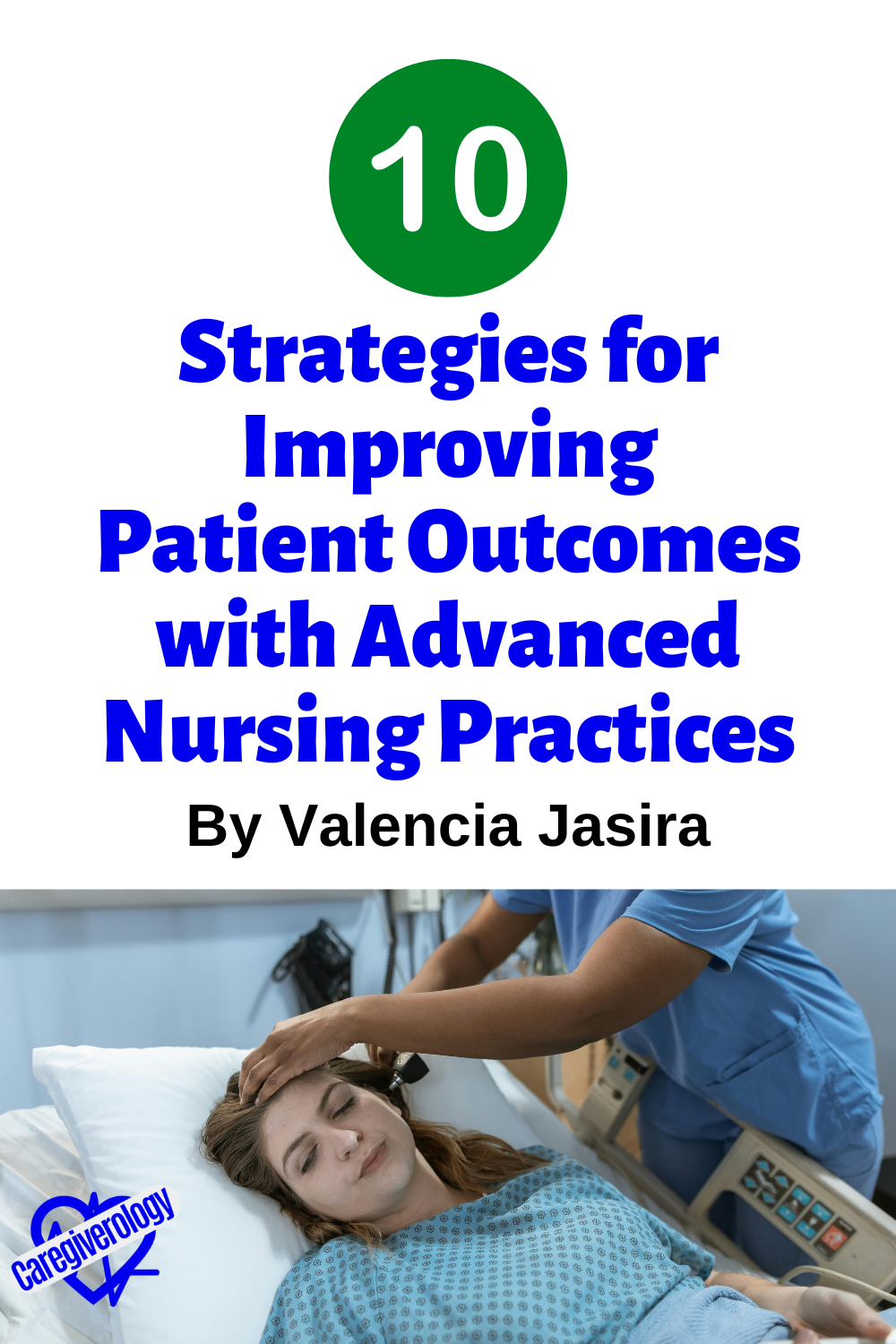10 Strategies for Improving Patient Outcomes with Advanced Nursing Practices

Advanced nursing practices play a pivotal role in the healthcare system, directly influencing patient outcomes through their expertise, leadership, and compassionate care. As healthcare becomes increasingly complex and technology-driven, the demand for highly skilled nurses continues to grow. Nurses today are not just caregivers but are crucial in implementing innovative health strategies and improving the efficiency of healthcare delivery. This article explores practical strategies that nurses can adopt to enhance their skills and knowledge, ultimately leading to improved patient care and health outcomes.
1 2 3 4 5 6 7 8 9 10 Conclusion
1. Embrace Evidence-Based Practice
One of the foundational strategies for enhancing patient outcomes is the adoption of evidence-based practice (EBP). EBP involves integrating clinical expertise with the best available research and patient preferences to make healthcare decisions. By staying updated with the latest research and applying it effectively, nurses can ensure that they are providing the most effective and efficient care. This approach not only improves patient outcomes but also contributes to the overall quality and safety of healthcare services.
2. Advance Your Education
Advancing education is crucial for nurses seeking to enhance their clinical skills and expand their professional roles. An advanced degree such as a Master of Science in Nursing (MSN) equips nurses with deeper knowledge and specialized skills that are essential in today’s complex healthcare environment. Courses such as an RN to MSN online program offer a flexible pathway for registered nurses to elevate their qualifications without interrupting their professional lives. These programs often include specialized training in areas such as healthcare management, advanced clinical practices, and patient safety, which are vital for improving patient outcomes.
3. Focus on Patient Education
Educating patients about their health conditions and the necessary steps to manage their care is another critical strategy. Effective patient education can significantly improve compliance with treatment plans and enhance patient engagement in their own care. Nurses play a key role in this educational process by providing clear, concise, and accessible information tailored to the patient’s level of understanding. This not only empowers patients but also fosters a collaborative relationship between the patient and healthcare providers, leading to better health outcomes.
4. Implement Interdisciplinary Collaboration
Interdisciplinary collaboration is essential for delivering comprehensive healthcare. By working collaboratively with a team of healthcare professionals, including physicians, pharmacists, social workers, and other nurses, advanced practice nurses can ensure that patient care is holistic and continuous. This teamwork facilitates diverse perspectives on patient care, leading to more comprehensive treatment plans and avoiding gaps in care. Effective collaboration also streamlines processes, reducing delays and improving the speed and quality of decision-making.
5. Utilize Technology and Informatics
Technology and health informatics are transforming nursing practices, offering new ways to improve patient outcomes. Nurses can leverage technology to monitor patient vitals, manage medical records, and facilitate communication among care teams. Familiarity with electronic health records (EHRs) and data analytics is particularly valuable as it enables nurses to track health trends, identify potential health risks, and provide data-driven insights into patient care. Embracing these technologies not only enhances efficiency but also supports more informed and timely clinical decisions.
6. Develop Specialized Skills
Specialization within nursing allows practitioners to acquire in-depth knowledge and expertise in specific areas of healthcare, such as cardiology, pediatrics, or oncology. Specialized nurses are often better equipped to handle complex cases within their areas of focus, leading to improved patient outcomes. Developing specialized skills requires additional training and education, which can be achieved through certifications, workshops, and advanced degree programs. Specialization not only improves a nurse’s ability to provide high-quality care but also enhances their career opportunities within the healthcare industry.
7. Promote a Holistic Care Approach
Holistic care is fundamental in nursing, involving the integration of physical, emotional, and social health factors into patient care. Nurses can lead the way in implementing a holistic approach by assessing not just the immediate clinical needs of patients but also considering their lifestyle, environment, and mental health. Such comprehensive care can lead to better patient engagement, higher satisfaction, and improved outcomes. Nurses should encourage their teams to consider all aspects of a patient's well-being during the treatment process, ensuring that care plans are as personalized and effective as possible.
8. Strengthen Leadership Skills
Leadership skills are essential for nurses aiming to influence practice settings and advocate for patient care excellence. Advanced nursing roles often require the ability to manage teams, make critical decisions, and lead healthcare initiatives. Developing strong leadership skills can be achieved through mentorship, leadership training programs, and practical experience. By cultivating these skills, nurses can better manage healthcare teams, lead improvement initiatives, and effectively communicate with all stakeholders, thereby directly enhancing patient outcomes.
9. Engage in Continuous Learning
The field of healthcare is ever-evolving, and continuous professional development is crucial for nurses who wish to stay at the forefront of the industry. Engaging in lifelong learning through additional certifications, advanced degrees, and regular training can help nurses maintain a high level of competency. This ongoing education enables nurses to keep up-to-date with the latest in healthcare innovations, treatments, and best practices, all of which are critical for providing the highest quality of care and improving patient outcomes.
10. Enhance Cultural Competence
Cultural competence in nursing involves understanding and respecting the diverse backgrounds of patients and tailoring care to meet their cultural needs. By enhancing their cultural competence, nurses can improve communication, patient trust, and health equity. Training programs, workshops, and practical experiences can help nurses develop the skills to effectively interact with patients from various cultural backgrounds, which is increasingly important in today's globalized society.
Conclusion
Improving patient outcomes through advanced nursing practices is more than a professional goal—it's a commitment to excellence in healthcare. Nurses who adopt these strategies enhance their ability to provide compassionate, effective, and efficient care. From continuing education and adopting a holistic care approach to strengthening leadership skills and enhancing cultural competence, each strategy is integral to elevating the standard of nursing practice. As nurses continue to expand their roles and influence within the healthcare system, their dedication to improving patient outcomes remains essential. By embracing these strategies, nurses not only advance their own careers but also significantly contribute to the health and well-being of their patients.
Thank you Valencia Jasira for contributing this article.
Guest Articles Written for Caregiverology
From 10 Strategies for Improving Patient Outcomes with Advanced Nursing Practices to Home
Recent Articles
-
How to Plan for Aging: Financial, Health, and Lifestyle Considerations
Mar 29, 25 12:40 PM
Did you know that 70% of people over 65 will need some form of long-term care? Yet, many delay planning until it’s too late. Aging is inevitable, but how we experience it depends on preparation. -
Speech Disorders: How to Know When It's Time to See a Professional
Mar 27, 25 07:05 AM
When it comes to human interaction, we need to be able to communicate effectively. -
Who Provides What? The Distinct Duties of Nurses and Caregivers
Mar 26, 25 07:37 PM
When it comes to healthcare, the roles of nurses and caregivers are often misunderstood. While both are essential in providing support and care, their responsibilities, training, and the level of care…





New! Comments
Have something to say about what you just read? Leave a comment in the box below.